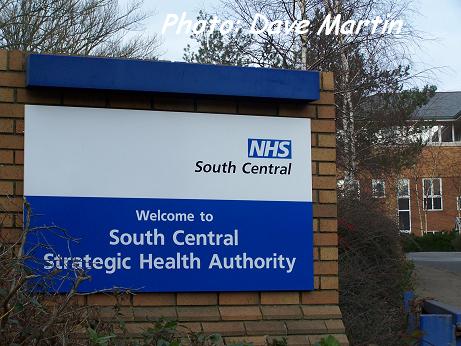1.4 The purposes of health care planing
This learning object reviews the different purposes for which health care planning may be undertaken, particularly from the perspective of GIS use. Students are encouraged to consider the ways in which the underlying motivation will affect the basic assumptions which are brought to the planning process and the ways in which these may affect the decisions made.

Figure 1: The NHS Strategic Health Authority office for South Central.
Photo by Dave Martin
The planning of health care in the context of increasingly specialised and costly medical services is frequently an emotive issue. Populations are generally concerned to have the maximum possible access to the best possible medical facilities and there is a strong geographical component to this aspiration. Nevertheless it is not possible to always be planning for growth: in some contexts, changing demographic characteristics and patterns of medical care mean that service provision is demonstrably in the wrong places or of the wrong types when judged by contemporary best practice or needs modelling. Closing clinics or hospitals is nevertheless almost always unpopular and stirs up well-meaning public opposition, frequently invoking ideological and political arguments. Similarly, the geographical organization of health care providers may mean that services available to the population of one area may not be available in a neighbouring area – a scenario which in the UK has frequently been termed the ‘postcode lottery’ (the implication being that entitlement to services is determined by a patient’s residential postcode rather than genuine need).
Activity
The suggested references are suggestive of the enormous range of health care planning issues that generate public attention and community conflict. Use a search engine to find some contemporary examples more relevant to your own local context and reflect on the extent to which it would be possible to develop and implement objective, evidence-based spatial planning of health services in these situations.Consider your own motivation for taking this module: are you studying out of general interest or with a particular professional development objective in mind? Write a short article (maximum 500 words) which explains why you believe a geographical perspective has a contribution to make to health care planning. Share your ideas with the tutor and other students through the discussion forum.
References (Essential reading for this learning object indicated by *)
Boulos, M. N. K. (2004) Towards evidence-based, GIS-driven national spatial health information infrastructure and surveillance services in the United Kingdom International Journal of Health Geographics 3, 1 https://ij-healthgeographics.biomedcentral.com/articles/10.1186/1476-072X-3-1
McKee, M. and Healy, J. (2000) The role of the hospital in a changing environment. Bulletin of the World Health Organisation 78 (6): 803-810 http://www.who.int/bulletin/archives/78(6)803.pdf.
Taylor, R. (2013) The save Kidderminster hospital campaign. Independent Kidderminster Hospital and Health Concern – an independent political party, focused around a single issue relating to healthcare facility location. http://www.healthconcern.org.uk/
A similar campaign exists around the location and plans for a new children’s hospital in Dublin, Eire via the New Children’s Hospital Alliance: http://thenewchildrenshospital.ie/